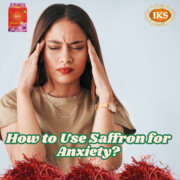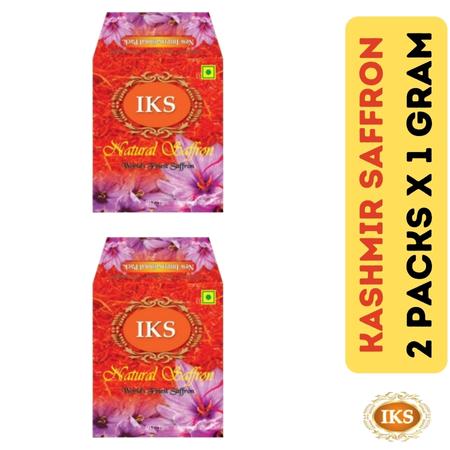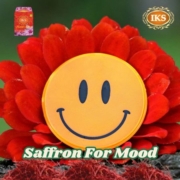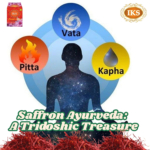How to Use Saffron for Anxiety?: Recipes, Dosage and Health Tips
How to Use Saffron for Anxiety?: Recipes, Dosage and Health Tips
How to Use Saffron for Anxiety – Anxiety is a common mental health issue that affects millions of people worldwide. While there are various treatment options available, many individuals are turning to natural remedies for relief.
One such remedy that has gained attention in recent years is saffron. This vibrant spice, derived from the flower of Crocus sativus, has been used for centuries in traditional medicine.
In this article, we will explore the benefits of saffron for anxiety, how to use it effectively, and the scientific research backing its efficacy.
🌼 Start your journey to anxiety relief today—try incorporating saffron into your routine!
How Saffron Works for Anxiety
The Science Behind Saffron and Anxiety Relief
Recent studies have shown that saffron can have a positive impact on mood and anxiety levels. The following mechanisms may explain how saffron works to alleviate anxiety:
Modulation of Neurotransmitters
Saffron may influence the levels of key neurotransmitters in the brain, such as serotonin and dopamine. These neurotransmitters play a crucial role in regulating mood and emotions. By enhancing serotonin levels, saffron can help improve mood and reduce feelings of anxiety.
Anti-Inflammatory Properties
Chronic inflammation has been linked to various mental health disorders, including anxiety. Saffron’s anti-inflammatory properties may help reduce inflammation in the brain, thereby alleviating anxiety symptoms.
Antioxidant Effects
Oxidative stress can negatively impact mental health. Saffron is rich in antioxidants, which can help combat oxidative stress and protect brain cells. This protective effect may contribute to its ability to reduce anxiety.
🚫 Don’t let anxiety control your life! Discover the soothing benefits of saffron now!
How to Use Saffron for Anxiety
Incorporating Saffron into Your Daily Routine
There are several ways to incorporate saffron into your daily routine to help manage anxiety. Here are some effective methods:
Saffron Tea
One of the simplest ways to consume saffron is by making saffron tea. Here’s how to prepare it:
Ingredients:
- 1-2 strands of saffron
- 1 cup of hot water
- Honey or lemon (optional)
Instructions:
- Place the saffron strands in a cup.
- Pour hot water over the saffron and let it steep for about 10-15 minutes.
- If desired, add honey or lemon for flavor.
- Stir well and enjoy the soothing effects of saffron tea.
Saffron Milk
Saffron milk is a delicious and calming drink that can be consumed before bedtime. Here’s how to make it:
Ingredients:
- 1 cup of milk (dairy or plant-based)
- 1-2 strands of saffron
- Sweetener of choice (optional)
Instructions:
- Heat the milk in a saucepan until warm.
- Add the saffron strands and stir well.
- If desired, add sweetener to taste.
- Allow it to cool slightly before drinking.
Saffron Threads
For those who prefer a more pure form of saffron, kesar threads are available. Look for high-quality saffron threads that contain required natural amounts of the active compounds. Always consult with a healthcare professional before starting any new regimen.
Culinary Uses of Saffron
Incorporating saffron into your meals can be an enjoyable way to harness its benefits. Here are some ideas:
- Saffron Rice: Add saffron to your rice dishes for a vibrant color and flavor.
- Saffron-infused Soups: Enhance the taste of soups by adding saffron during cooking.
- Saffron Desserts: Use saffron in desserts like rice pudding or custards for a unique twist.
✨ Transform your mental well-being—explore how saffron can help alleviate anxiety!
Dosage and Safety Considerations
Recommended Dosage of Saffron
While saffron is generally considered safe for most people, it is essential to follow recommended dosages. Studies have shown that a daily intake of 5 to 7 threads of saffron can effectively reduce symptoms of anxiety. However, individual responses may vary, and it’s best to start with a lower dose and gradually increase it.
Potential Side Effects
Saffron is well-tolerated, but some individuals may experience mild side effects, including:
- Nausea
- Allergic reactions
- Dizziness
If you experience adverse effects, discontinue use and consult a healthcare professional.
Interactions with Medications
Zaffran may interact with certain medications, particularly those that affect serotonin levels (such as antidepressants). If you are taking medication for anxiety or depression, it’s crucial to consult with your doctor before using saffron.
Conclusion
Saffron is a promising natural remedy for anxiety, supported by both traditional use and scientific research. With its ability to modulate neurotransmitters, reduce inflammation, and combat oxidative stress, saffron offers a multifaceted approach to managing anxiety symptoms.
Whether consumed as tea, milk, or supplements, incorporating saffron into your daily routine may provide the relief you seek. However, always consult with a healthcare professional before starting any new treatment to ensure it is safe and appropriate for your individual needs.
Embrace the potential of saffron and take a step towards a calmer, more balanced life.
🌈 Embrace a calmer life—Buy saffron for anxiety today!
Additional Tips for Managing Anxiety
Lifestyle Changes to Complement Saffron Use
While saffron can be beneficial for anxiety, it’s essential to adopt a holistic approach to mental health. Here are some lifestyle changes that can complement saffron use:
Regular Exercise
Engaging in regular physical activity can help reduce anxiety levels. Exercise releases endorphins, which are natural mood lifters. Aim for at least 30 minutes of moderate exercise most days of the week.
Mindfulness and Meditation
Practicing mindfulness and meditation can help calm the mind and reduce anxiety. Consider incorporating mindfulness techniques into your daily routine, such as deep breathing exercises or guided meditations.
Healthy Diet
A well-balanced diet rich in whole foods can positively impact your mental health. Incorporate plenty of fruits, vegetables, whole grains, and lean proteins into your meals. Avoid excessive sugar, caffeine, and processed foods, as they may exacerbate anxiety symptoms.
Quality Sleep
Prioritize getting enough sleep each night, as sleep deprivation can worsen anxiety. Establish a calming bedtime routine and create a sleep-friendly environment to promote restful sleep.
Social Support
Connecting with friends and family can provide emotional support and reduce feelings of isolation. Don’t hesitate to reach out to loved ones when you’re feeling anxious.
2 GRAMS 100% PURE ORIGINAL AUTHENTIC PREMIUM TOP BEST HIGH QUALITY A+++ GRADE IKS KASHMIRI SAFFRON (KESAR / KUMKUMA PUVVU / KUNGUMAPOO / KUMKUMPUVVU / ZAFFRAN) FOR ANXIETY
Final Thoughts
Using saffron for anxiety can be an effective natural remedy, especially when combined with other healthy lifestyle choices. As more people seek alternative treatments for anxiety, saffron stands out as a promising option with a rich history and growing body of research.
By understanding how to use saffron effectively and adopting a holistic approach to mental health, you can take charge of your well-being and find relief from anxiety.
Remember, it’s essential to consult with a healthcare professional before making significant changes to your health routine. Embrace the journey towards a more peaceful mind with the natural power of saffron.
🌟 Experience tranquility with saffron! Click to learn how it can help with anxiety!









Leave a Reply
Want to join the discussion?Feel free to contribute!